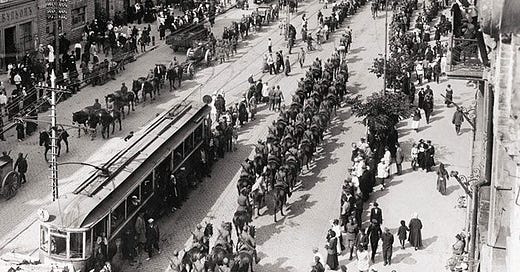States of War
Parties with national agendas are gaining ground in multicultural societies. It has largely been forgotten that between 1918 and 1921, these agendas plunged Eastern and Central Europe into civil war.
As the historian Lewis Namier observed, there is a morphology of politics; certain forms occur and reoccur. Historical revisionism appears to be intrinsic to a form of government that Namier describes as plebiscitary Caesarism, but which we might also call Orbànism or Erdoğanism.
The cultivation of nostalgia for an authoritarian past tends to presage an authoritarian future. Such regimes rest on revisionism because they must. They would otherwise seem too closely to resemble regimes that led to disaster. History must be obscured, or changed outright, lest the public begin to suspect that an experiment that led once to catastrophe might do so again. This is a point I’ve made before.
Today in the Cosmopolitan Globalist we have an essay for you by Jochen Böhler, a German historian who specializes in the history of Eastern Europe in the 19th and 20th century, and especially the history of the World Wars, the Holocaust, nationality, and the borderlands.
He begins with the historian Ernest Renan’s thesis:
The act of forgetting, I would even say, historical error, is an essential factor in the creation of a nation, which is why progress in historical studies often constitutes a danger for nationality. Indeed, historical enquiry brings back to light the deeds of violence that took place at the origin of all political formations, even of those whose consequences have been the most beneficial. Unity is always achieved brutally.
Böhler notes that nationalist governments in Poland and Hungary are promoting a nationalist historiography in contradiction with historic facts. These facts, he argues, are worth considering carefully; above all, it is worth considering what really happened between 1918 and 1921, when nationalist theories like those now returning to vogue were put into practice.
An understanding of this period, he argues,
is more necessary today than ever. In the face of a resurgent national populism, historians must make their findings accessible to a broader public. Similar events are occurring in Britain, France, Germany, Hungary, and Poland, as parties with national agendas are gaining ground in multicultural societies. The fact that these agendas plunged Eastern and Central Europe into a civil war between 1918 and 1921 has been largely forgotten.
Please join us at the Cosmopolitan Globalist to read and discuss his article.






This tale completely and conveniently (or willfully) overlooks a major event that contradicts the author's argument. Pilsudski's Polish National Army route of the invading Red Army in 1920. This was not a civil war. It was the defeat of an old national enemy and 100 plus year occupying force reconstituted as a communist nation state. To suppose that this event, noted by many as one of the most significant 20th century battles, did not legitimately spark Polish national identity is a critical oversight. It may have assumed mythic status in Poland but it is not a myth.
In addition, after WWII, Stalin revived a Polish communist national state that was far less ethically or religiously diverse than the previous Republic. And lest we forget, the Poles struggled against this Russian satellite status for a very long time. Can we thus assume that the long resistance efforts of Solidarity were also a ‘civil war’ or that they should not be legitimately attached to Polish national identity? How can the author overlook this period entirely. Did Polish history stop in 1921?
Let me now paraphrase Rehan.. “The act of forgetting, I would even say, historical error, is an essential factor in the creation of” Bohler’s argument in this piece.